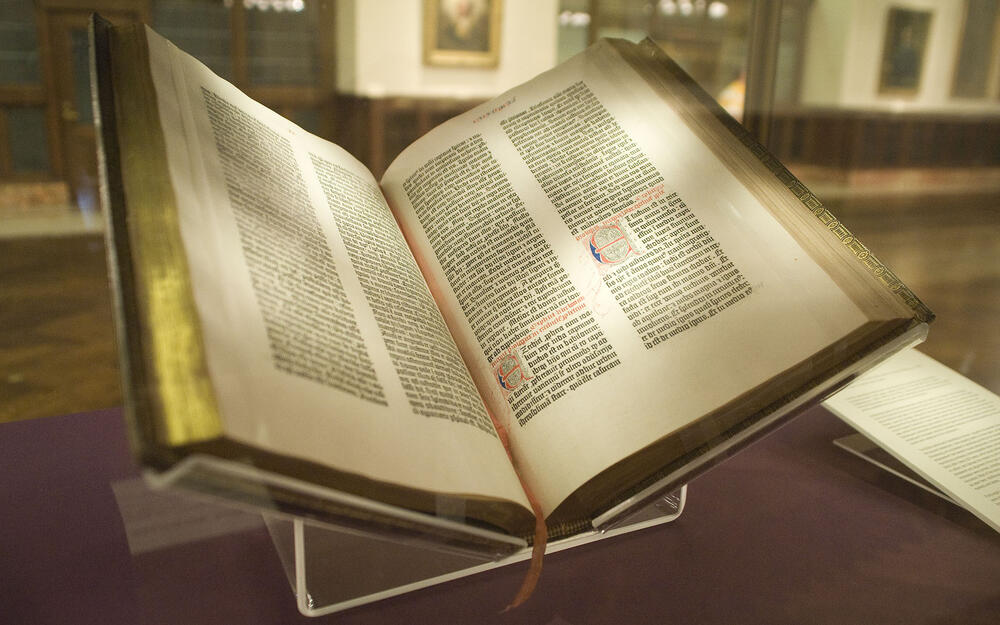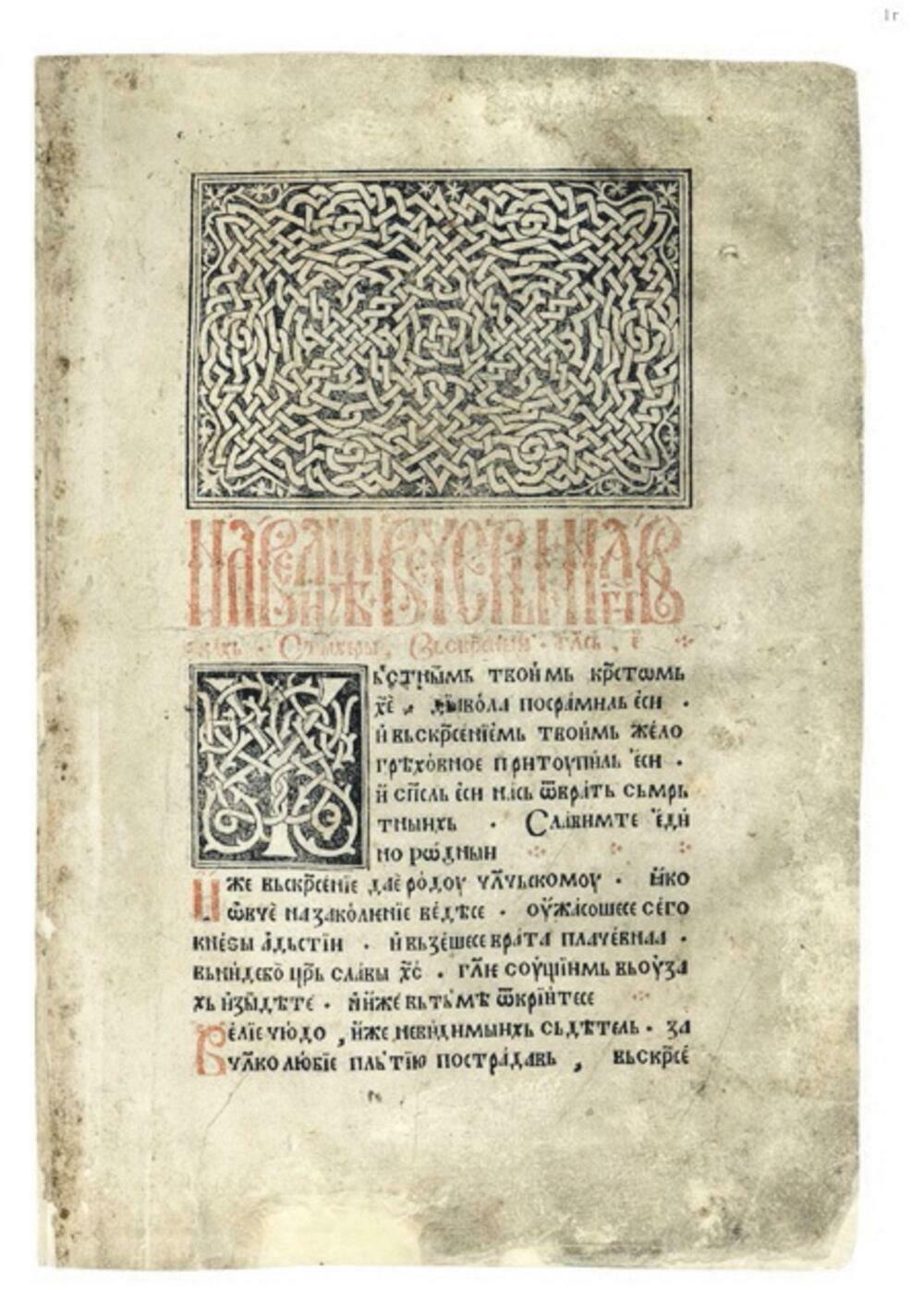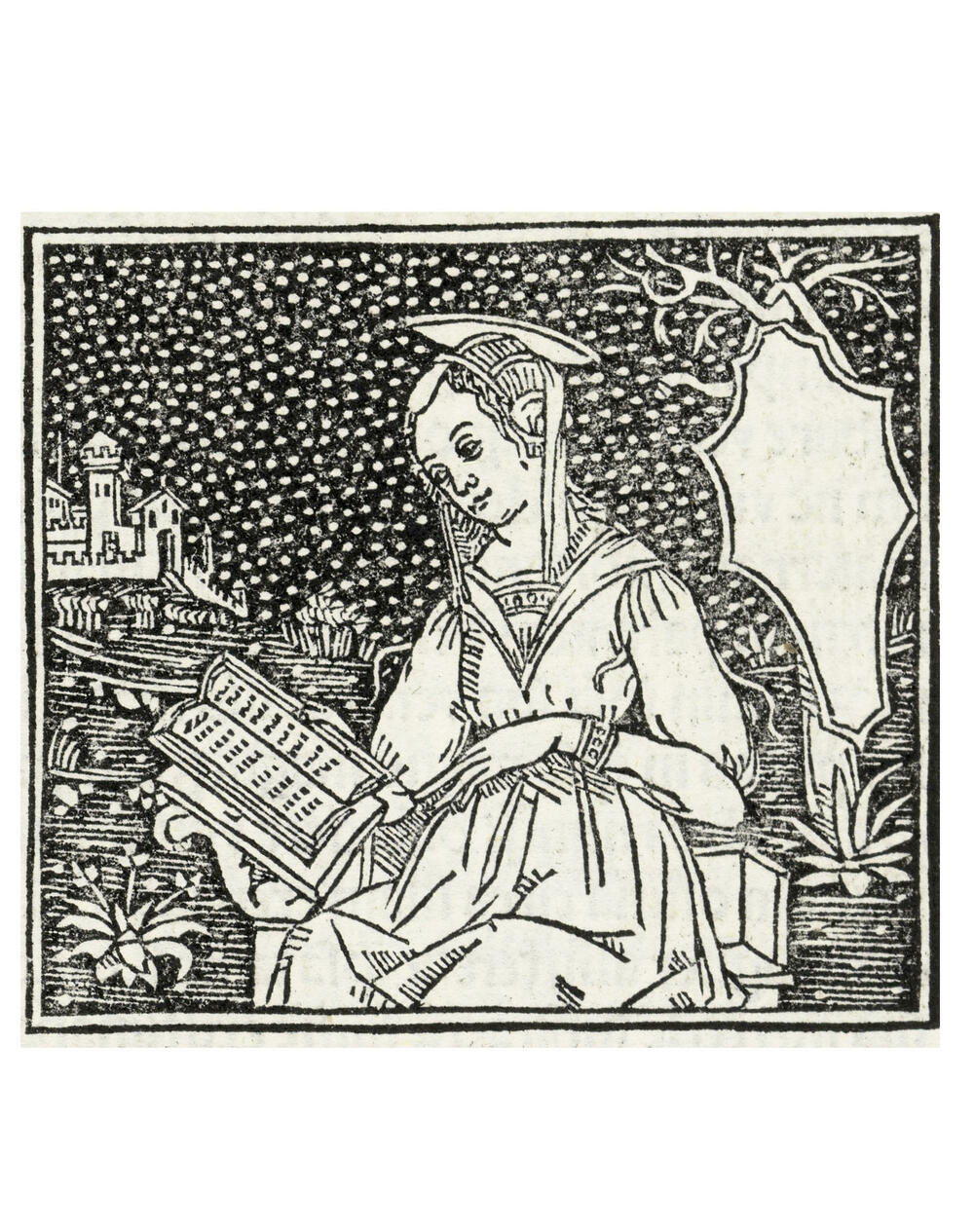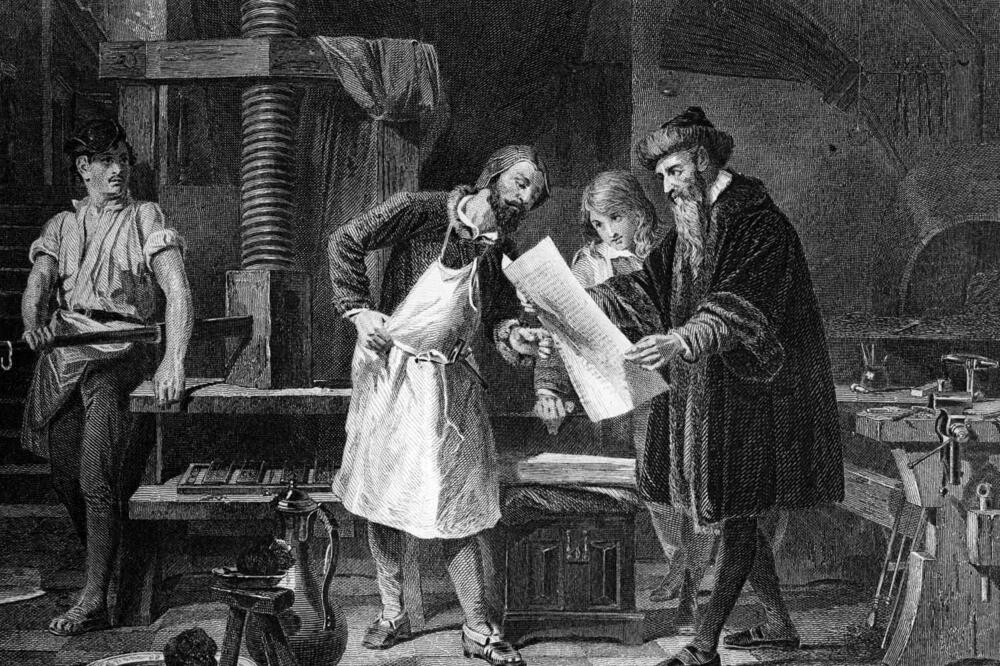Today is April 23 - World Book Day.
One story about the book is - magnificent. Namely, the concept of political power was fundamentally reshaped by the book. It is no coincidence that the invention of printing coincides with the beginning of the end of feudalism. Among other things, Gutenbergov the invention, more than any other act in history, democratized knowledge, and overthrew the power of isolated castles and monasteries, which jealously guarded their immeasurably valuable libraries. This was the basic prerequisite for the development and momentum of cities - feudal concepts of power were already dying out. Of course, politically, that story will continue for several hundred years, but, you should know - when you see them, things actually happened a long time ago.
All subsequent decisive political upheavals are simply unimaginable and impossible without the role of the book. And it is no coincidence that almost all dystopian visions of the near or distant future exclude the book, or even make it completely "unsuitable" and politically unacceptable.
(Roman Ray Bradbury “Fahrenheit 451”, better known thanks to Trypho's film from 1966, depicts a future world where books are burned because they are declared dangerous. Disturbingly, this film seems much more "real", much "closer" today, than when it was made.)
Precisely for all the reasons for which it can be considered dangerous - the book is (along with the wheel, I guess) the most influential invention of mankind.
The text is our Home
That is why Book Day is a great day, the most beautiful among holidays, the most worthy of celebration.
Because Book Day is the day of the world, the day of man and the day of freedom. All this (the world, man, freedom) was born in the Book, and one day it will return to it. Into the last cosmic dust, the dust of words and signs... That great Borgesian Book of sand.
That is why I believe that the Book and the City are the two most crucial concepts in the history of human civilization. The world as we know it has given us a Text that precedes personal experience and makes it possible or at least expressible. (These are sometimes synonyms - possibly also indicative.)
We all walked the streets of Jerusalem, we all defended or attacked Troy, wandered the corridors of Elsinore or the alleys of Dublin, stormed windmills, awaited execution "in Paris, by the Pontoise", ran by the Mississippi, lay in the mud of Austerlitz like Prince Bolkonsky, watched a headache Hegemon Pontius Pilate and his discomfort...
The idea of belonging to one culture is grounded in our experience of the Text. In our relation to the Text. And the ways in which the Text makes us human.
Because the Text is our Home. That Heideggerian House of Battle.
This is where we are born and continue.
The text does not know dying, manuscripts do not burn, the text in its essence is anti-death, it is for all time... In the end - we do not die in the Text, we die for the Text.
In the case of Oktoich, that great and unexpected flash of imagination of a ruler and a semi-mythical country, we almost have a literal coincidence of the birth of the Book and the City, Obod and Cetinje.

Dialogue culture
What does he mean? barzan when he says that "the press made a revolution out of heresy"?
"New ideas and discoveries spread, of course, among literate people even before the appearance of the printed book, but the spread of manuscripts was random and slow. Manual transcription is the mother of all errors, and the high cost limits circulation. As we have already said, the press turned heresy into a revolution. Speed in propagating ideas breeds heightened excitement. In addition, a manuscript scroll or bundle (codex) on parchment or primitive paper is difficult to read, awkward to handle and store. Indexing was also absent or incomplete, since the medieval mind rejected the alphabetical order - it was "artificial", "irrational", because no principle governed the sequence of the alphabet and the rest. For a modern book lover, a print product is an object that evokes deep feelings, so looking at it Dürer's charcoal drawing, hands holding a book, we think the artist felt the same attachment. A book, like a bicycle, is a perfect form.” (Barzan, p. 70.)
Not only was it perfect as a self-sufficient object, but the printed book set in motion a series of processes, each of which was an important brick in the construction of the tower of modernity of the European nations.
First of all, the press, with its appearance, stimulated to the maximum the need of people to learn to read, as it most directly caused the process of normative standardization in almost all European languages. The momentum of new literature is also conditioned by this invention. A change in tone in literature, a change in audience: it is no longer a narrow court circle addressed by the poet, but a much wider and more diverse layer of differently curious people. A kind of broad brotherhood of spirit is developing among readers that ignores geographical limitations: reports of new worlds will soon become a literary fashion. Which was actually just the flip side of ordinary imperialism. But that's an introduction to another story.
The unification of letters, punctuation, text arrangement rules, all of this is in one way or another a consequence of Gutenberg's invention. The momentum of printing made all these questions urgent, and the answers to them created the world as we know it.

But the list of important events and processes initiated by the printed book does not end there either. As we said - the concept of political power was decisively reshaped by the book.
Namely, the possibility and experience of the press promoted general polemics from one end of Europe to the other, we got an era of spiritual reflections that, in terms of their breadth and social effect, were unimaginable until that time.
If you were the author of some kind of religious pamphlet, the fate of your ideas depended on the echo that the press made possible. And the issue of distribution was, of course, not unimportant: the network of trade-connected cities across northern and western Europe will be the infrastructure that will serve the so-called new ideas. Printed proclamations on religious or political matters traveled along those paths blazed by spices, amber, and costly fabrics.
This is where the dialogic culture of the West was born, this is where the seeds from Hellenic Ionia finally bore fruit, this is where we got the basic premise for modern democracy. And they opened the world stage for Reason.
Orthodoxy and monological culture
This is perhaps the right place to shed some additional light on the qualification that we are all happy to draw. Small nations enjoy beyond measure any circumstances that bring them first place. In anything.
It is always emphasized, not without pride, that the Crnojević printing house is the first state printing house.

That is, of course, true. And it undoubtedly refers to the visionary and awareness of the cultural mission of the then ruler.
But, this fact largely determines its essence and the nature of its reach, its impact on a society and a culture in its constitution.
The first printing houses were, like most innovations, a private business, and competition among printers largely depended on their offer, that is, on the topicality and popularity of the text they print.
It was the first marketing - but what kind. Engravings for printed books were made by masters such as Dürer or Baldung Green, suddenly you had a whole wave of allegorical drawings, complex engravings that gave the book another stamp of exceptionality.
In addition to church books (that was, today we would say, a safe market), a whole flood of theological polemical texts is moving to meet the political tension that will change the position of Christianity in a good part of Europe. An operation Luther's ideas without the printing press would be incomparably smaller, the resonance would not be close to what is needed to change the social paradigm. And that was a paradigm shift, the biggest in the second millennium.
But the fact that the Printing House on Obod was "state-owned" means that this dynamizing moment of polemics, that is, the impulse that created a dialogical culture, was excluded. Obod's printing house, for understandable reasons and the effect of concrete historical reality, was directed to orthodoxy. Montenegrin culture chronically lacks heretics. They give birth to a dialogic experience important to every culture.
And isn't that, in one way or another, one of the most important constants of Montenegrin culture - its orthodoxy, or the intention of orthodoxy, whatever the content of that term was in one of the historical epochs.
Also a kind of fear of disagreement. There are extremely rare periods when polyphony was the basic tone in Montenegrin culture.
Political platitudes like "unity and monolithicity", which are extremely popular here from time to time, are nothing but one of the manifestations of this fear of diversity.
Maybe that's why in Montenegro to this day the label "state" in the case of culture refers to consent, orthodoxy, suitability, absence of incident. And, the most important thing - monologue culture.
The act of forgetting
For us, every anniversary of Oktoih and Crnojević printing house is a kind of looking in the mirror. And what do we see there?
What is the most important thing that face tells us?
Rank, above all. And whoever does will be the best...
Changing the world around us through action.
Today it is easy to imagine what happened a long time ago: there, Đurađ Crnojević was smarter than others, he knew Venice, which at that moment was one of the most important cities in Europe, the cultural center of the political West, he saw in a new technology a real opportunity to enlighten his country, to establish spirituality...
But imagine that time - printing is a novelty, almost like artificial intelligence today, or quantum computers tomorrow. Few people know anything about it in Montenegro, with the exception of the coastal cities where the press, naturally, was quickly domesticated. But the area around the lake still lives its medieval nocturne.
I try to imagine how the action developed, how the idea took shape. Whom did he send to Venice to deliver the entire scalameri? What did those who transported her south think? What are they wearing? What kind of device is that? Could the Devil have anything to do with it?
The imagination of Đurađ Crnijević (i Ivana master, since, apparently, he is already thinking about the need for books) and his active demon deserve not only our gratitude, but also sincere recognition for feeling the spirit of the times (zeitgeist). And there are not many rulers in Montenegrin history who could boast of that sense and that understanding.
I am convinced that the ruler was aware of how much the printing press could change Montenegro. But sometimes neither the right idea nor the right moves are enough.
Therefore, at the very source of that grandiose epoch, Montenegro, this area is at the heart of the most important spiritual events. Even with elements of the "avant-garde" approach, when it comes to the "role" of the state.
All this could mean that at that moment, at the beginning of that historic race, the backlog of Montenegro was minimal, if there was any.
What happened was that the following centuries were turned into a gap that convincingly separated us from the cultural stream to which we, not only by intention, but organically, actively, naturally, belonged.
Forgetfulness is like sand - it can cover everything. No matter how beautiful and powerful a building is, when sand covers it, it disappears from the landscape.
Sand settles everything, as does oblivion.

Often in the case of the Montenegrin past, you have the feeling that many of the gloomy images and episodes carry much more meaning than we usually believe. It's as if all our pictures are accompanied by the blur of the forgotten.
Forgetting is always an act of impoverishment. In the case of communities, the result is even worse than in the case of individuals. The negative effect is greater and its effect more devastating.
Are we as a culture too prone to forget what should be remembered. (Sometimes it seems that we are prone to the reverse process - so we also remember what should be left to the mercy of oblivion.)
When the history of a community begins with a printing house and continues in the absence of books, then it is the ecstasy of forgetting. Of fatally forgetting one's own essence.
How to return to the Book, we ask half a millennium after the Book happened here.
Books and windows
After Octoich i Psalter, will follow, in Montenegro, when it comes to books, empty centuries.
It is certain that there were some books in churches and monasteries, a good part of those books were blown up in the middle of the 19th century, but that is the second chapter of the Montenegrin story of (self)forgetting.
When it comes to continental Montenegro, things only change over time Petar II Petrović.
In that time, if anything was a book, it was as if it wasn't - pops were literate mostly like Njegoš's pop Mićo, and the rest of the population - not so much.
Since the epoch Crnojevica until the early 19th century this was a land without books. And without windows on the houses. Djilas it is written in the study "Njegoš" that at the time of Rad Tomov's birth, the only two houses with windows (in the area that was then Montenegro) were Njegoš houses Petrović i Radonjic.
Houses without windows are caves with doors, a shelter and not a home...
The absence of windows and books condemns the housemates to the same punishment - the absence of a view.
To today's reader, this information must sound creepy. But I believe that it gives a true picture of the loss of that space in one historical moment.
Things started to change only - with the increase in the number of windows and books.
It would be interesting to consider those windows, or their absence, in the context of cultural anthropology.
And, of course, even in Montenegro at the time, everything started from Power, as he would remind Michel Foucault.
It is likely that the two houses mentioned by Đilas - Petrović's and Radonjić's - are not only the only ones with windows, but also with at least a book under the roof, among the householders.
The first step of emancipation
The Montenegrin story in history is the story of emancipation.
Here is another word that has changed its meaning somewhat throughout history. In Roman law, the word denoted a freed slave, but also the release of an adult son from the authority of his father and their acquisition of civil-legal independence. With the development of civil society, "the meaning of the term evolves and is expanded. Now it means the process of liberating classes, classes, groups or peoples from spiritual, legal, social or economic disenfranchisement and subjugation” as he explains Waltraud Vende.
The twentieth century made the term extremely important - decolonialization, feminism, ecology, pacifism - all were based on the universal spirit of emancipation. Not just a simple liberation, but also an understanding of the reasons and genesis of subjugation, whatever form it is.
That is why the reading of the twenty-century processes that marked Montenegrin society, but also the entire Montenegrin history, is the most natural key to emancipation. One of the first and most important steps on that path is the Obod printing house.
The essence of emancipation is always self-awareness, and it does not exist without remembering what constitutes us and makes us individual human beings.
Memory in certain circumstances becomes a subversive activity. You have situations when your defense of memory is the defense of identity and integrity.
It is no coincidence that all totalitarianisms attack memory. Memory is the last zone of the defensive self. If someone takes away what you remember, you cease to exist.
In the end, our memory is the only thing that makes us resistant to totalitarianism and its demons. In the end, if we have no memory we cannot recognize unfreedom.
Our story of memory in the shadow of Octoich could be the story of the return of the Book.
Again, in this time of superficial emotions and quick sensations, what can the Book mean? Milan Kundera in the novel "Slowdown" proposed a return to a forgotten strategy from the 18th century (the era that Italo Calvino called "the last great age of eccentrics and weirdos"). Slowdown is, Kundera claims, the essence of ancient seduction.
The dictum of speed that exists in today's world does not bypass art either. Today, the biggest punishment for a writer or film author is if critics write that the book (or film) does not move at a frenetic speed.
I recently saw an advertisement in a literary magazine for a novel by a popular crime author. The slogan I read stunned me. I had to read it several times, believing that I had overlooked or seen something wrong. It said: "A novel that is quickly read, and even more quickly forgotten." When did the fact that the book is "quickly forgotten" become commendable? I remember a time when any writer would take this as an insult.
So why then? In short - with this kind of advertisement, you promise the reader vanity that won't burden him even a moment after the finished reading. And obviously, people need it (or think they need it), if such an advertising slogan is even possible. That's the ultimate perversion - by selling a story, you actually become sellers of oblivion.
Who are they at the time Makarija Štampar and Crnojević chronically missing books, today's Montenegrin society chronically lacks Dialogue. Book culture is a culture of dialogue.
Here is a more historically and mentally based pilfering of this or that type. And that's not uninteresting: the spirit of hajducija evokes much more attention and respect, admiration in today's Montenegro than the spirit of a book.
On World Book Day, let's say that the story of the book crisis has been going on for a hundred and a half years. Just like the story of the end of art, spirit, humanity... it still goes on. And it will last, by all accounts, for hundreds of years, in fact, until the end of the world, in one form or another.
A book, as the aforementioned Barzan said, is like a bicycle, a perfect form.
And the perfect message. For all times and for all people.
So, let's open the windows and the books, that's the only way to see...
(CANU, April 23, 2024)
Bonus video:





